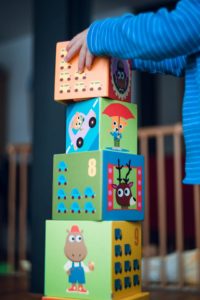 Imagine a child building a towering castle with blocks, giggling as they chase a friend in the park, or engrossed in a world of make-believe with stuffed animals. This isn’t just fun and games; it’s play, the cornerstone of healthy child development. This article explores the incredible benefits of play, supported by both pediatricians and rehabilitation specialists.
Imagine a child building a towering castle with blocks, giggling as they chase a friend in the park, or engrossed in a world of make-believe with stuffed animals. This isn’t just fun and games; it’s play, the cornerstone of healthy child development. This article explores the incredible benefits of play, supported by both pediatricians and rehabilitation specialists.
What is the Benefit of Play in Children?
According to the American Academy of Pediatrics (AAP), play is an integral part of children’s development across various domains. Play is the primary motivation for desired movements and activities in learning and self-exploration. There are numerous benefits of play in children’s development domains:
- Physical: Play promotes active movement, thus enhancing gross motor skills and physical fitness. Adaptive strengthening exercises can be incorporated through play, for example, by throwing a ball, riding a bicycle, and swimming. Strengthening the small muscles of the hand can be achieved by playing with clay and adaptive putties.
- Emotional: Play provides a safe outlet for expression and stress relief, promoting resilience and self-confidence. Opportunities to play and meet with peers in school or at home, during visits and sleepovers with friends, and participation in recreational activities are formative experiences that teach children to regulate their emotions.
- Cognitive: Play stimulates curiosity and problem-solving abilities, encouraging exploration and creativity. A child’s cognitive development can be observed through their engagement with toys, games, or books, as well as their attention span and ability to focus during play.
- Language: Play enriches children’s communication skills and vocabulary development. A lack of varied spontaneous make-believe or socially imitative play appropriate to their developmental stage may indicate a language delay.
- Imagination and Creativity: Play allows children to explore roles and scenarios, fostering imagination and innovation. In preschool children with developmental delay or mental retardation, they were more likely to play on their own and show no interest to participate in play compared to other neurotypical peers.
- Social Functioning and Adulthood: Meeting and playing with friends, whether able-bodied or disabled, fosters cooperation, negotiation, and empathy, preparing all children for social interactions and adulthood.
Why Play Matters (Paediatric Perspective)
Science tells us that play isn’t frivolous; it’s fundamental for brain development. As children play, they build new neural connections, fostering cognitive skills like problem-solving and decision-making. Running, jumping, and building with blocks hone motor skills, while imaginative play sparks creativity and social interaction. Through play, children learn to communicate, cooperate, manage emotions, and build self-esteem. During check-ups, pediatricians can assess a child’s play development, observing their interaction with toys and engagement with others. If needed, they may recommend play-based interventions to address specific areas.
 The Power of Play in Rehabilitation (Rehabilitation Specialist Perspective)
The Power of Play in Rehabilitation (Rehabilitation Specialist Perspective)
For children with special needs, play therapy becomes a powerful tool in rehabilitation. Rehabilitation specialists use play activities specifically tailored to address developmental delays, disabilities, or injuries. A child with sensory processing issues might benefit from play involving textures and movement, while a child with communication difficulties could use play to practice social interaction skills. Rehabilitation specialists often collaborate with pediatricians and parents to design effective play-based therapy programs that are both fun and therapeutic.
Enhancing Play at Home (Actionable Tips)
Now that you understand the importance of play, how can you create a nurturing environment for your child at home? Here are some practical steps:
- Open-Ended Toys: Opt for toys that encourage creativity and imaginative play, like blocks, dolls, cars and trucks, art supplies, and dress-up clothes.
- Unstructured Playtime: Dedicate time for unstructured playtime where your child takes the lead! This allows them to explore their interests and experiment at their own pace.
- Imaginative Play: Join your child in their imaginary world! Narrate their actions, create scenarios, and let your own imagination run wild.
- Adult Participation: Being present during playtime is crucial. Engage with your child, ask questions, and follow their cues.
Remember, the goal is for your child to have fun and explore their world through play.
Conclusion
Play is more than just fun; it’s a vital pathway for fostering healthy development in children. As demonstrated by both pediatricians and rehabilitation specialists, play strengthens the mind, body, and social skills. Make playtime a priority, create a stimulating environment, and watch your child blossom through the power of play!
This article was written by:
Dr Nurul Firdausi Binti Hasnol Basri, Rehabilitation Specialist and Medical Lecturer in Faculty of Medicine, University Malaya
Dr Adilah Binti W. Ab Rahim, Paediatrician and Medical Lecturer in Faculty of Medicine and Health Sciences, University Sains Islam Malaysia
References:
- American Academy of Pediatrics (AAP), Ginsburg, 2007; Pellegrini & Smith, 2005; Christie & Roskos, 2006; Burdette & Whitaker, 2005
- Pediatric Rehabilitation Principles and Practice, Alexander MA & Matthews DJ, Demos Medical Publishing, 2010.
- Skene K, O’Farrelly CM, Byrne EM, Kirby N, Stevens EC, Ramchandani PG. Can guidance during play enhance children’s learning and development in educational contexts? A systematic review and meta-analysis. Child Dev. 2022 Jul;93(4):1162-1180. doi: 10.1111/cdev.13730. Epub 2022 Jan 12.
- Yogman M, Garner A, Hutchinson J, Hirsh-Pasek K, Golinkoff RM. The Power of Play: A Pediatric Role in Enhancing Development in Young Children. Pediatrics. 2018 Sep;142(3):e20182058. doi: 10.1542/peds.2018-2058. Epub 2018 Aug 20.
